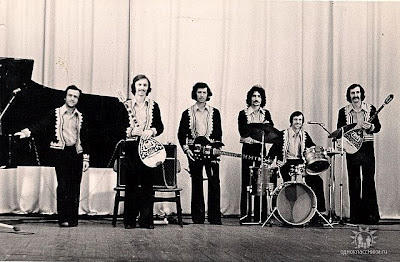 |
| Greek family gathering, Tashkent 1972 |
However, it was in the 15th century, following the fall of Constantinople and the marriage of Greek Princess Sophia to Tsar Ivan III of Russia, that a steady migration of Greeks to Russia began. The religious and cultural ties were strong.
After Catherine the Great's armies reached the Black Sea and founded the city of Odessa, many Greeks settled there; before the Russian Revolution there were over 500,000 Greeks living in Tsarist Russia.
Prior to WWII about 30,000 Greeks lived in Uzbekistan, most forcibly sent there by Stalin. Another 11,000 settled in Tashkent as political refugees following the Greek Civil War (1946 - 1949). Many Greeks worked on the Golodnaya Steppe (also known as the Hungry Steppe). Begun in 1956, this was a Soviet agricultural project on a grand scale, to cultivate the naturally saline virgin lands, an area of 10,000 square kilometres in Eastern Uzbekistan, about 160 kilometres from Tashkent.
 |
| Musicians performing at the Greek Cultural Centre, Tashkent 1970s |
The Soviet Union actively supported the Greek Communist Party within its borders and performers such as composer and musician Mikis Theodorakis regularly visited Tashkent.
In 1982 the Greek government passed an Amnesty Law permitting the return and repatriation of the political refugees who had left Greece during the civil war. Many returned to their homeland. Others, however, had married and created a life for themselves in Uzbekistan and elected to stay. After Uzbekistan became an independent nation, further repatriations followed.
 |
| Greek guys hanging around Tashkent, 1970s |
The Greek Cultural Association is located at 30 A Yusuf-Hos-Hodgib Street 100031, Tashkent. Telephone: 998 971 256-28-03. It is not far from the Applied Arts Museum.
Update May 2015: For readers who wish to learn more about this fascinating topic, Elaina Lampropoulos recently published her excellent thesis Belonging to Greece and the Soviet Union: Greeks of Tashkent 1940 - 1974. Her research and its findings are based on oral histories and Greek-language newspapers published during the period as well as on memoirs of Greeks who lived in Tashkent.
Related posts:
Alexander the Great's March from St Petersburgh to Sydney
Tashkent: A City of Refuge
Uzbek-Korean Connections
Images courtesy of Maria Eustathiou, Tashkent, from her family album
Materials source: Central Asia-Caucasus Analyst